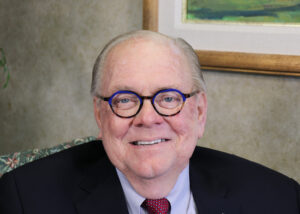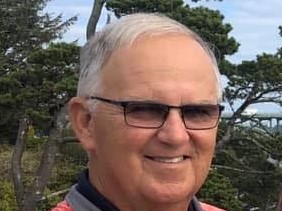Statehouse Conversations
About this Collection
Statehouse Conversations contains interviews with former legislators who served from 1960-2020. The collection is significant because the interviews focus on public policy issues and the dynamics of the legislative process as the starting point for legislators’ recollections. Interviewees were selected because they played leadership roles in the development of substantive public policy.
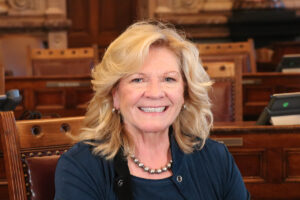
Interview of Jayne Aylward, June 18, 2021
Interviewed by Alan Conroy
Jayne Aylward Oral History Interview describes her experiences as one of the youngest members of the Kansas House of Representatives. Aylward was elected in 1978 from the 74th District in Saline County, Kansas. She served from 1979 to 1990 when she resigned to become an administrative tax judge with the Kansas Board of Tax Appeals. She later became a Certified Public Accountant specializing in tax matters. Aylward is a rancher and stockwoman in addition to having a thriving tax practice in Salina. During the interview she discusses her interest in agriculture and taxation which came Show Morefrom growing up on her family farm and her participation in 4-H showing cattle. During the 1985-1986 legislative session, she was the Chair of the House Communications, Computers and Technology Committee. She also served on the House Federal and State Affairs committee and the House Taxation committee, both of which handled high-profile issues that she discussed in the interview, including reappraisal and classification of property taxes and a constitutional amendment authorizing the Kansas lottery. Show Less

Interview of Marvin Barkis, October 27, 2017
Interviewed by H. Edward (Ed) Flentje
Marvin Barkis discusses, in detail, the various processes within the House of Representatives in its day-to-day work. He points out differences in working as the majority versus the minority party and talks about working with the governors during his terms in office. When Barkis was the minority leader, he tried to build a sense of community among party members to facilitate working together. Barkis also made changes in legislative procedures to promote efficiency. Much of the interview addresses these internal procedures. Marvin Barkis' primary legislative passion was children’s issues and the interview covers the various attempts to Show Morework on a variety of topics to aid children. He was also involved with school finance, reapportionment, and the death penalty. Show Less
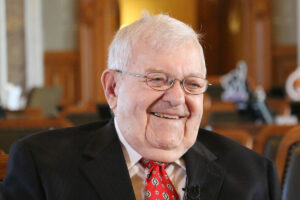
Interview of August (Gus) Bogina, February 6, 2018
Interviewed by H. Edward (Ed) Flentje
In this 2018 oral history interview, former State Senator August (Gus) Bogina discusses his service in the Kansas Legislature, focusing on his 14 years in the Senate. Bogina reflects on his relationships with Senate leaders and governors during his 11 sessions as Chair of the Senate Ways and Means Committee. Bogina also describes his storied ride with the Highway Patrol when he was brought back from Johnson County following bypass surgery to cast the deciding vote on the water plan funding.
A version of this interview is also posted on KansasMemory.org, the website of the Kansas Historical Society.

Interview of Richard (Dick) Bond, September 6, 2019
Interviewed by Joan Wagnon
Former Senate President Dick Bond candidly discusses his 14 year career in the Kansas Senate which followed a 25 year career in Washington DC as chief of staff for 3 congressmen. Well known in Kansas Republican circles, Bond was appointed to fill a vacancy when Senator Jack Walker became Lieutenant Governor. Bond compares the politics of Washington to Kansas. He saw the passage of liquor-by-the-drink as a boon to economic development. Bond is most proud of the renovation to the Kansas Capitol which was started under his term as President of the Kansas Senate. He Show Morereflected on the changes in the Republican party in recent years and the role the Right to Life movement played in those changes. Show Less

The Legislative Wives – Conversation with Sue Bond, wife of former Senator Dick Bond, September 6, 2019
Interviewed by Joan Wagnon
This short conversation with Sue Bond describes her experiences with other wives of Kansas legislators and wives of Kansas Governors. The Legislative Wives Association was formally organized in 1933 as a social medium for the wives of Kansas state legislators during sessions. The group held luncheons every week, rotating who acted as hostesses. Informally organized in 1929, the group originally met at the Topeka YWCA and later met at hotels in the city, mostly the Jayhawk Hotel. In this conversation Bond describes the Wives group as important for social support, information sharing, and fund-raising for Cedar Crest with Show Morethe sale of their Capitol Cookbook. Show Less

Interview of Bill Bunten, February 18, 2015
Interviewed by Burdett Loomis
Bill Bunten's 28 years in the House, 20 of them on the Ways and Means or Appropriations committee, gave him tremendous knowledge about the state budget. He chaired Appropriations from 1983 until 1990 when he left the legislature. He returned to the state Senate in 2003 to fill an unexpired term. Bunten later served two terms as Mayor of Topeka from 2005 until 2013.
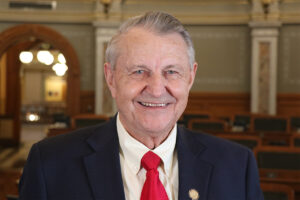
Interview of Richard Carlson, February 9, 2024
Interviewed by Chris Courtwright
Richard Carlson held several important positions in Kansas government --Secretary of Transportation, Chair of the House Taxation Committee, County Commissioner of Pottawatomie County--in addition to being a farmer/cattleman, banker, businessman. In his interview he speaks candidly about his efforts as Tax Chairman to pass and implement Governor Brownback's tax plan of 2012. He acknowledges the plan as finally passed was "unsustainable." In 2016 Governor Brownback appointed Carlson as Secretary of Transportation. His 2-3 years as head of that agency saw a lot of progress in implementing various transportation projects around the state.
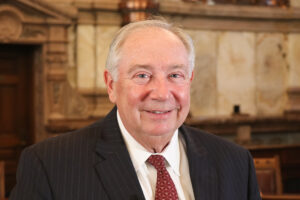
Interview of Jim Denning, April 13, 2023
Interviewed by Alan Conroy
Jim Denning served four years as Majority Leader for the Kansas Senate. His interview reveals his Western Kansas leanings, despite having worked, lived and represented Johnson County. HIs legislative interests included health care policy, funding KPERS and school finance. He described Senate Bill 9--KU Cancer designation--as one of his important contributions. Denning found that Governor Brownback’s tax plan was creating problems for Kansas – “too deep and unsustainable.” His philosophy was, "At the end of the day, you have to govern." Throughout his tenure in the Senate, Medicaid expansion was a pressing issue, but Show Morehe didn’t like the way the bills were constructed, so he developed a Republican alternative that he thought would be a model for the country. His interview details how he kept the Democratic alternative from passing, but his own bill was caught up in abortion politics and failed to pass. Denning led the Senate during 3 special sessions: school finance, COVID and repealing the Brownback tax plan. Historians will love this interview because of his candor and his position at a pivotal time in the legislature's history. Show Less

Interview of Leslie (Les) Donovan, April 10, 2024
Interviewed by Chris Courtwright
Les Donovan served twenty-four years in both the House of Representatives (four years) and the Kansas Senate (twenty years) from 1993 to 2016. From his position on the tax committees of the House and Senate, he influenced major tax legislation including the tax cuts of the late 1990's. While chairing the Senate Assessment and Tax Committee from 2009 - 2016, he was very involved with the legislature's efforts to correct the budget problems caused by the Great Tax Experiment in 2012. He often called attention to the high property tax rates on automobiles and finally Show Moresucceeded in lowering them. He was an advocate for small business during his entire term. He also advocated for using fuel tax to fund highway needs. This interview is a very substantive discussion of tax policy at a time of great change in Kansas. Show Less
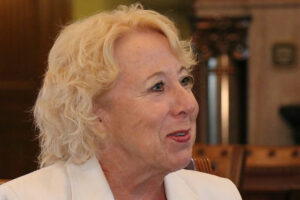
Interview of Christine Downey, August 2, 2019
Interviewed by Dale Goter
Former State Senator Christine Downey recalls her three terms in the Kansas Senate (1993-2004) during her 2019 oral history interview. With her background as a teacher, education issues were important to her as the era of school-funding litigation continued. She was involved in water-related policy making, in particular at the nexus of water quality and agricultural practices. She recalls her service in the Senate and on the Kansas Board of Regents first developing the policy and then implementing fundamental changes to the postsecondary education system. Ms. Downey discusses numerous instances of working across the aisle Show Moreto accomplish policy objectives that did not break on strict party lines. Show Less
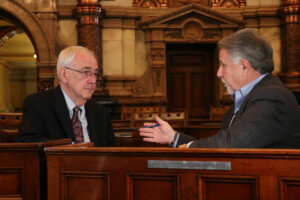
Interview of Tim Emert, October 4, 2019
Interviewed by Jim McLean
Tim Emert's interview covers his Senate career in the last decade of the Twentieth century, following passage of a markedly different school finance bill in 1992 and with a divided Republican caucus in the Senate--a time of big change. Emert stepped into the chairmanship of the Senate Judiciary committee immediately and later moved up to Majority Leader by a one-vote margin. The interview is filled with descriptions of coalitions he formed to get legislation passed. As Judiciary chair Emert dealt with both the death penalty, which he personally opposed, and a bill restricting late term abortions which Show Moreno one liked but passed. He worked with Christine Downey to get a major policy change regarding community colleges. There are also descriptions of his work on the State Board of Education and later, the Board of Regents. Emert describes himself as neither moderate or conservative, but "a realistic Republican." As Majority Leader he talks about the "juggling act" trying to keep communication with the conservative House Speakers (Shallenburger and Jennison) and the Senate. He explains the tension in having both the poorest and richest counties in his district and trying to provide equalization of school funding. The interview touches on the renovation of the Capitol and also renovation of Cedar Crest. Show Less

Interview of Jack Euler, April 22, 2015
Interviewed by Burdett Loomis
Jack Euler talks about his ten years in the Legislature and the formal and informal leadership dynamics he witnessed. Euler notes the changes in the Legislature that began with initial implementation of the one person, one vote principle as the basis for legislative districts rather than the county-based system that had existed since statehood. He describes how redistricting gradually changed the urban-rural dynamic of the House. Euler also reflects on the influence of lobbyists on both legislation and leadership in the House.
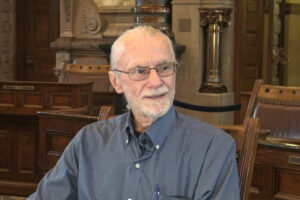
Interview of Robert (Bob) Frey, August 2, 2019
Interviewed by Jim McLean
Robert Frey had considerable impact on the legal system after he arrived in 1975. Court unification had passed as a constitutional amendment; now the legislature had to implement it. Early in his legislative career Frey took on some controversial issues, such as the hearings he held in the House Judiciary committee on the Posse Comitatus to ban paramilitary training and legislation ensuring every county had a judge. This interview does not deal with the plethora of issues which originated in the House Judiciary committee under Frey's leadership, such as codification of the sexual crimes including marital rape, Show Morebut it does reveal his philosophy about the law, the courts and judges. The interview also provides a glimpse into the rise of the conservative influence from a group know as "the Cowboys." The interview concludes with a discussion of activities on the Board of Tax Appeals. Show Less

Interview of Jim Gartner, February 16, 2024
Interviewed by Chris Courtwright
This interview sheds light on several activities related to the Kansas Legislature, particularly the role of lobbyist in decision making and the role of school boards in governance of education. It begins in 1967 with quite a tale of Gartner's service as a young Marine, wounded in VIetnam and how that impacted his career choices. A brief work experience building tires at Goodyear convinced him to get a college degree. Southwestern Bell Telephone hired him as one of the first male telephone operators in Kansas. He ended up as Vice President of External Affairs many years Show Morelater. He began his lobbying career in 1987 partnered with Denny Koch. Together they helped define deregulation and worked with both the legislature and the Kansas Congressional Delegation. In 2009 Gartner was appointed to the USD 437 school board to fill a vacancy. That's where he learned about school finance and governance. In 2016 Rep. Annie Tietze resigned and Gartner won that legislative seat. The House Taxation Committee was a logical appointment, given his lobbying background. The Brownback Tax Experiment was failing, and the legislature was eager to repeal it. Brownback vetoed the bill passed by the legislature; they quickly overrode his veto and restored more conventional tax policy. The interview concludes with a discussion of the food sales tax exemption proposed by Governor Kelly and Gartner's frustration with the legislative process and how it changed over the 30 years of his involvement. Show Less

Interview of Kent Glasscock, June 11, 2021
Interviewed by Alan Conroy
As Majority Leader, and then as Kansas House Speaker, Kent Glasscock found ways to work productively with the conservative wing of the Republican caucus. The first part of the interview describes how Glasscock decided to run for office and his six campaigns.
As he moved up in leadership, the interview talks about several situations where his views as a moderate Republican clashed with the growing number of conservatives in the Republican caucus. Finally, Speaker Shallenburger called Glasscock to his office and together they made peace and subsequently worked well together. Glasscock cites the school finance bill that Show Moredealt with a capital outlay for school buildings as one of his best, most long-lasting accomplishments as well as the Confined Animal Feeding legislation. Styling himself as a true "policy wonk", Glasscock's descriptions of legislative antics in passing legislation are really interesting. This interview gives a picture of how the legislature transitioned to conservative control during his 12 years in office. Show Less

Interview of Ron Hein, April 16, 2021
Interviewed by Alan Conroy
Ron Hein, former legislator, lobbyist, and lawyer speaks about his 47 years in and around the Kansas Legislature and his impact on Kansas policy. He ran first for the House in 1974 in a 7-way primary which he won. Two years later he ran for the Senate, winning after extensive door-to-door campaigning against a well-known Senator, Bob Storey. He was just 25 when he was sworn into the Senate in 1975, Hein tells some interesting anecdotes about working with Speaker Pete McGill and Senate President Ross Doyen, particularly in his first years in the legislature. Hein Show Moresponsored or cosponsored 142 pieces of legislation on a wide variety of topics. His interview recounts the difficulty he had getting the Higher Education Loan program passed when he was in the House. Ultimately it failed the first year but passed the second. Hein noted the lack of lawyers in today's legislature is detrimental to the process, as is an increased lack of civility. The interview concludes with Hein discussing his lobbying career and why he felt he needed to leave elected office when T. Boone Pickens approached him to represent Mesa Petroleum. Hein notes that he has been more successful getting legislation passed as a lobbyist than as a legislator. Show Less

Interview of Dave Heinemann, July 10, 2014
Interviewed by Burdett Loomis
In this 2014 oral history interview, Dave Heinemann recalls his long career in the Kansas House representing Garden City, a career that spanned the years during which there were important changes in Kansas government. He served during an era when rural influence in the Legislature was waning due to fundamental changes in legislative districts. Heinemann's recollections of how legislators serve their constituents and how they worked with one another to craft legislation paint a picture of collaboration in the creation of public policy. His perspective points to the importance of personal relationships with colleagues within the chamber, Show Moreacross the rotunda in the Senate, and with the Governor's office. Show Less
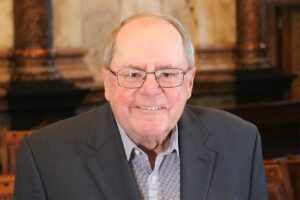
Interview of Anthony Hensley, September 16, 2022
Interviewed by Alan Conroy
Senate Minority Leader Anthony Hensley was first elected to the Kansas House of Representatives in 1976 at the age of 22. He moved to the Senate in 1992, finishing an unexpired term of Senator Nancy Parrish. His interview covers his 44 years in the House and Senate, and almost every issue the legislature dealt with in those years: taxes, reapportionment, school finance and labor issues, to name a few. His story about negotiating with Dick Bond to increase funding for schools is a "must read". Hensley's description of how the Brownback tax cuts were Show Moreenacted after the Senate reconsidered its vote to kill them is a lesson in how parliamentary maneuvering between House and Senate can have unexpected consequences. There are many stories about other leaders and other issues to illustrate how the legislature makes laws.
Highlights -- short excerpts from the interview

